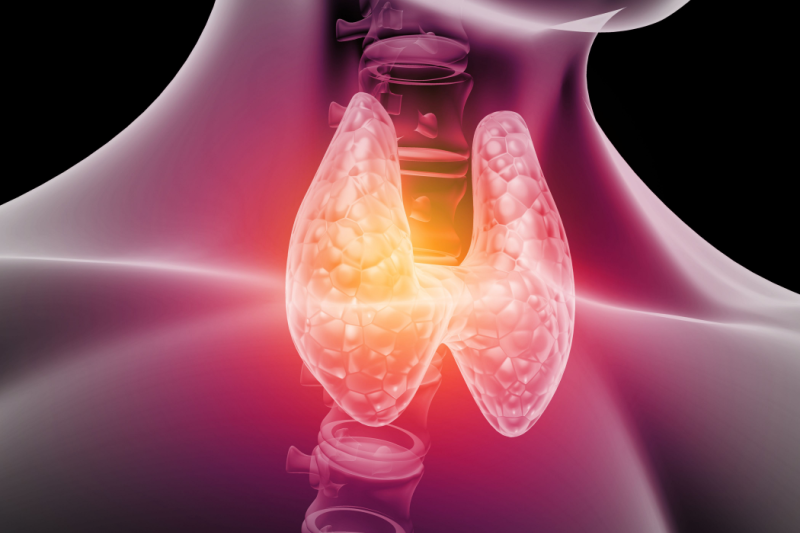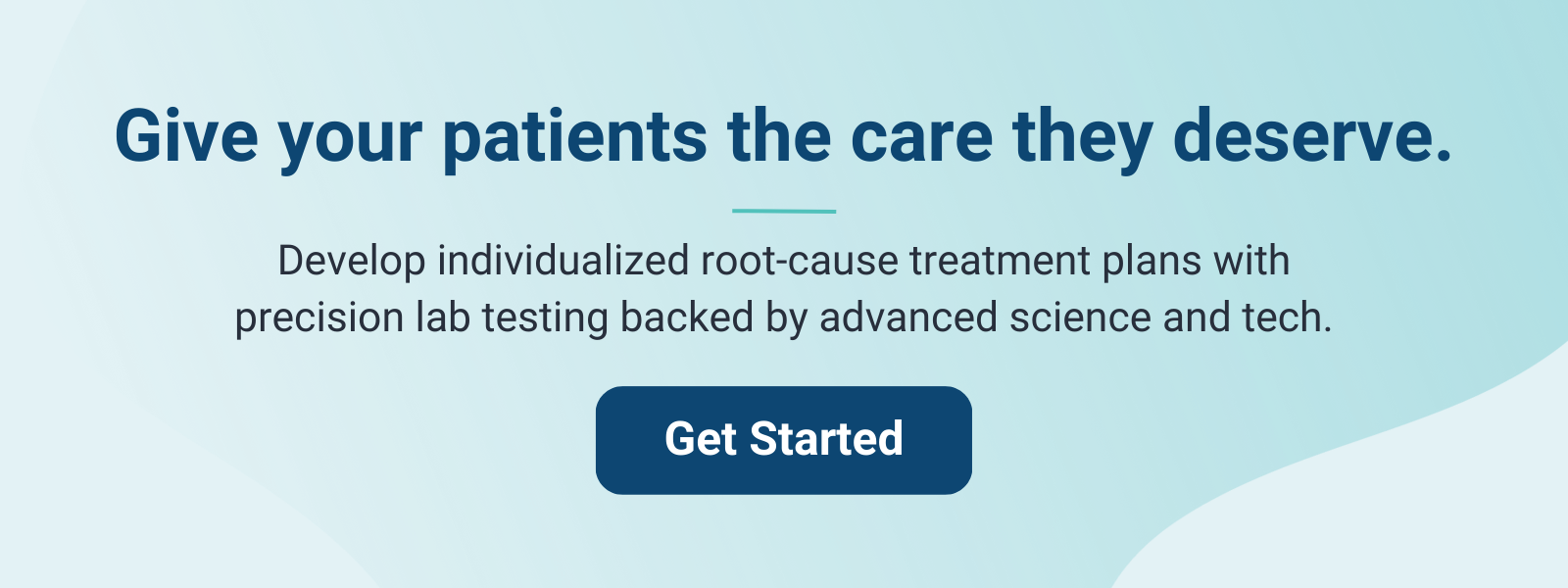Women are disproportionately affected by thyroid dysfunction due to a complex interplay of hormonal, genetic, and immune factors. Up to 90% of patients with Hashimoto's thyroiditis and Graves' disease are female. Hashimoto's occurs 10–15 times more often in women than men. This striking gender gap reflects the complex effects of sex hormones on immune regulation.
When it comes to diagnosis, symptoms of autoimmune thyroid diseases often precede lab abnormalities. Inflammation of the thyroid gland can cause systemic symptoms before TSH or free T4 markers fall. Even euthyroid patients with Hashimoto's frequently report persistent fatigue and reduced quality of life linked to their autoimmune status. Other studies suggest that many "healthy" individuals with thyroid autoantibodies already have subclinical autoimmune thyroiditis.
This article explores the role of female sex hormones in the prevalence and timing of thyroid symptoms, and discusses how advanced autoantibody panels, such as the Autoimmune Zoomer, can detect immune activity before traditional hormone labs reveal any abnormalities.
Table of Contents
The Role of Female Sex Hormones and Autoimmunity
There are a few key differences between female and male hormones:
- Estrogen enhances humoral (antibody-mediated) immunity, while androgens (male hormones) are relatively immunosuppressive.
- Estrogen suppresses the routine deletion of autoreactive B-cells and skews T-helper cell balance toward pro-autoimmune responses, while male hormones dampen antibody production.
With these actions in play, female sex hormones—particularly estrogen—enhance immune activity, increasing autoimmune risk during hormonal fluctuations like pregnancy, postpartum, and perimenopause.
Consequently, higher estrogen levels (or a high estrogen-to-progesterone ratio) promote thyroid autoimmunity. For example, women with polycystic ovary syndrome (PCOS), a state of elevated estradiol relative to progesterone, have significantly higher rates of anti-TPO antibodies and Hashimoto's thyroiditis.
Key female life stages illustrate hormone-autoimmunity links:
- Puberty and menstrual cycles: The onset of menstrual cycling (rising estrogens) and monthly hormone shifts can coincide with the initial appearance or worsening of thyroid antibodies.
- Pregnancy: Rising progesterone promotes a Th2 (tolerant) immune environment that often temporarily improves autoimmune symptoms during pregnancy. However, pregnancy also increases thyroid hormone demand, and women with autoimmune thyroiditis may develop elevated TSH levels. The American Thyroid Association recommends TSH testing during pregnancy for at-risk women as to prevent complications like preeclampsia or fetal developmental issues.
- Postpartum: After delivery, an "immune rebound" can trigger thyroiditis. The immune system's rebound destroys thyroid cells, causing a flare of disease before it settles down. Affecting up to 10% of women, postpartum thyroiditis often involves a hyperthyroid phase followed by hypothyroidism. Those with pre-existing Hashimoto's thyroiditis are at a higher risk.
- Perimenopause: As progesterone declines, autoimmune risk is further heightened.
- Menopause: Loss of estrogen at menopause alters immune regulation and can unmask or exacerbate autoimmunity. Many women report new or worsening thyroid autoimmunity around menopause.
Overall, each endocrine transition, from puberty to pregnancy to menopause, profoundly impacts immune tolerance and autoimmune risk in women.
Autoimmune Thyroid Diseases: A Hidden Culprit

The thyroid gland, a small butterfly-shaped organ in the neck, produces the hormones thyroxine (T4) and triiodothyronine (T3), which regulate metabolism, energy production, and other bodily functions, such as heart rate, body temperature, weight, and mood.
Thyroid dysfunction causes the thyroid gland to produce too much thyroid hormone (hyperthyroidism) or too little (hypothyroidism). It can also affect the structure or function of the gland. Autoimmune disease occurs when the immune system attacks the body's tissues.
Hyperthyroidism and Graves' Disease
Hyperthyroidism is commonly associated with Graves' disease. It may cause:
- Weight loss
- Heat intolerance
- Anxiety
- Palpitations
- Tremors
Graves' disease involves thyroid-stimulating immunoglobulin (TSI) antibodies that overstimulate the thyroid. Women are 5–10 times more likely to develop these conditions, with prevalence peaking during reproductive years and perimenopause.
Hypothyroidism and Hashimoto's Thyroiditis
Hypothyroidism is often linked to Hashimoto's thyroiditis. It may present with:
- Weight gain
- Cold intolerance
- Fatigue
- Dry skin
- Hair loss
- Brain fog
In Hashimoto's thyroiditis, antibodies like anti-thyroid peroxidase (TPO) and anti-thyroglobulin (Tg) target thyroid tissue, causing inflammation and gland damage.

Connecting Thyroid Symptoms to Autoimmune Processes
Symptoms like fatigue, weight gain, and cold intolerance in hypothyroidism and weight loss and anxiety in hyperthyroidism often signal autoimmune activity.
Standard thyroid tests (TSH, free T4, free T3) may remain normal in early autoimmune thyroid disease, delaying diagnosis. However, thyroid antibody tests (such as anti-TPO, anti-Tg, and TSI) can detect autoimmune processes before hormone levels are impacted, allowing for much-needed early intervention.
Why Early Detection Matters
Traditional thyroid tests may miss early autoimmune activity. A typical thyroid panel that tests TSH, Free T4, and Free T3 may appear “normal,” even when autoimmune activity has already begun. One study on euthyroid autoimmune thyroiditis found that elevated anti-TPO and anti-Tg antibodies correlated with oxidative stress, suggesting early cellular damage.
Even when antibodies (like TPOAb) are measured, some providers wait to intervene until hormones shift. But this misses a critical window for early support and immune modulation.
Early detection enables lifestyle interventions like gluten-free diets or stress reduction to modulate immune activity. Medical interventions, such as thyroid hormone replacement, can prevent other complications like cardiovascular disease or pregnancy-related issues.
Integrating Autoimmune Testing: The Autoimmune Zoomer
The National Institute of Diabetes and Digestive and Kidney Diseases highlights the value of antibody testing when TSH is abnormal or autoimmune thyroid disease is suspected. Practitioners can enhance diagnostic accuracy by incorporating autoantibody testing and autoimmune disorder testing. Screening for thyroid dysfunction is critical, especially for women with systemic autoimmune diseases.
A comprehensive autoantibody panel can be beneficial in identifying immune dysfunction. The Autoimmune Zoomer allows practitioners to detect autoimmune markers, often before hormonal imbalances, symptoms, or lab abnormalities are visible. The test can help identify overlapping autoimmune conditions common with thyroid autoimmunity.
The Autoimmune Zoomer screens for over 30 autoimmune-related antibodies and endocrine autoimmunity markers, including those linked to thyroid autoimmunity (TPO, Tg, TSI). It also screens for antinuclear antibodies (ANA), indicating broader immune dysregulation. Practitioners can validate patient symptoms and start preventive care by identifying antibodies like TPO or TSI, even in seronegative patients or those with borderline TSH.

Case Study: Early Detection of Hashimoto's Thyroiditis
Lisa, a 38-year-old woman, had persistent fatigue, gained 10 pounds in over six months, and experienced cold intolerance and mild hair thinning. She shared a family history of hypothyroidism (her mother) and experienced irregular menstrual cycles, suggesting possible hormonal fluctuations. Lisa was in the early stages of perimenopause.
 Initial assessment: Standard thyroid function tests showed a TSH of 3.8 mIU/L (within the reference range of 0.4–4.5 mIU/L) and normal free T4 (1.2 g/dL). After receiving these results, Lisa ordered the Autoimmune Zoomer test.
Initial assessment: Standard thyroid function tests showed a TSH of 3.8 mIU/L (within the reference range of 0.4–4.5 mIU/L) and normal free T4 (1.2 g/dL). After receiving these results, Lisa ordered the Autoimmune Zoomer test.
Test results: The Autoimmune Zoomer test revealed significantly elevated anti-TPO antibodies (120 IU/mL, reference <30 IU/mL) and moderately elevated anti-Tg antibodies (45 IU/mL, reference <20 IU/mL). The ANA test was negative, suggesting thyroid-specific autoimmunity. These results led to a diagnosis of Hashimoto's thyroiditis, despite normal TSH and free T4 levels.
Intervention: Given the association between celiac disease and Hashimoto's, Lisa was recommended to follow a gluten-free diet. She also started a supplementation program that included selenium to reduce oxidative stress, magnesium and N-acetyl-cysteine for thyroid hormone production and detox pathways, Vitamin D, and zinc for immune regulation. Stress management techniques, including mindfulness, were introduced to mitigate cortisol-driven immune activation. Lisa was closely monitored and retested for TSH and antibodies after three months.
Outcome: After three months, Lisa reported improved energy and stabilization of weight. Follow-up testing showed a slight reduction in anti-TPO antibodies (95 IU/mL) and stable TSH (3.5 mIU/L). She was encouraged to continue the current protocol, emphasizing dietary adherence and stress reduction.
Lisa's results illustrate the power of advanced autoantibody testing in detecting autoimmune thyroid disease before hypothyroidism develops. Early intervention tailored to the test results improved Lisa's quality of life and likely helped slow disease progression.
Key Takeaways
Thyroid dysfunction in women is often autoimmune-driven. Female sex hormones increase autoimmune risk, particularly during pregnancy and perimenopause. Understanding the autoimmune factors of thyroid dysfunction, especially in women, is critical for practitioners. Symptoms like fatigue, cold sensitivity, and weight changes should trigger further immune system evaluation beyond routine thyroid panels.
By integrating functional testing like the Autoimmune Zoomer, practitioners can shift from a reactive to a proactive model, catching immune system dysfunction, often before hormone tests show any abnormalities. Early detection allows patients to implement lifestyle changes and opt for medical interventions, such as thyroid hormone replacement, to help preserve thyroid function and prevent other complications.

About the Author
Nancy Guberti, M.S., C.N., is a functional medicine practitioner, medical educator, and founder of the Total Wellness Empowerment Institute, offering accredited courses for Certified Autism Health Coach Training, Certified Master Health Coach Training, and Practitioner Mentorship. She empowers others to achieve optimal wellness and has appeared in Shape, SheKnows, WorldLifestyle, Associated Press, and Huffington Post. Her book, Healthy Living Every Day: Total Wellness For Mind & Body, is available on Amazon. Connect with her on Instagram and LinkedIn.
Regulatory Statement:
The information presented in case studies have been de-identified in accordance with the HIPAA Privacy protection.
The general wellness test intended uses relate to sustaining or offering general improvement to functions associated with a general state of health while making reference to diseases or conditions. This test has been laboratory developed and its performance characteristics determined by Vibrant America LLC and Vibrant Genomics, a CLIA-certified and CAP-accredited laboratory performing the test. The lab tests referenced have not been cleared or approved by the U.S. Food and Drug Administration (FDA). Although FDA does not currently clear or approve laboratory-developed tests in the U.S., certification of the laboratory is required under CLIA to ensure the quality and validity of the test.










